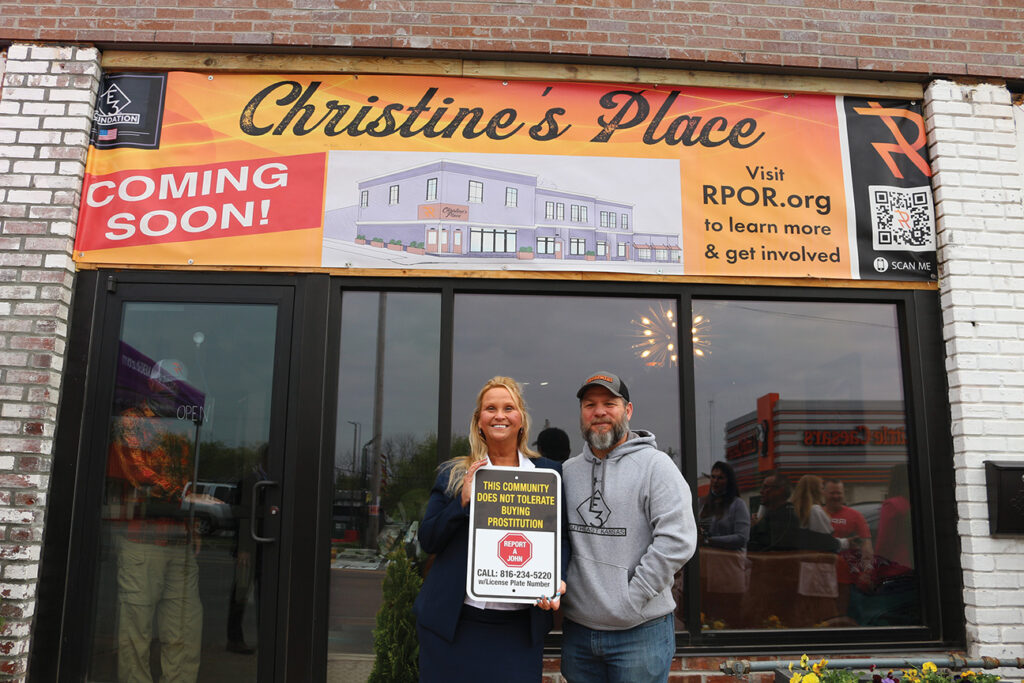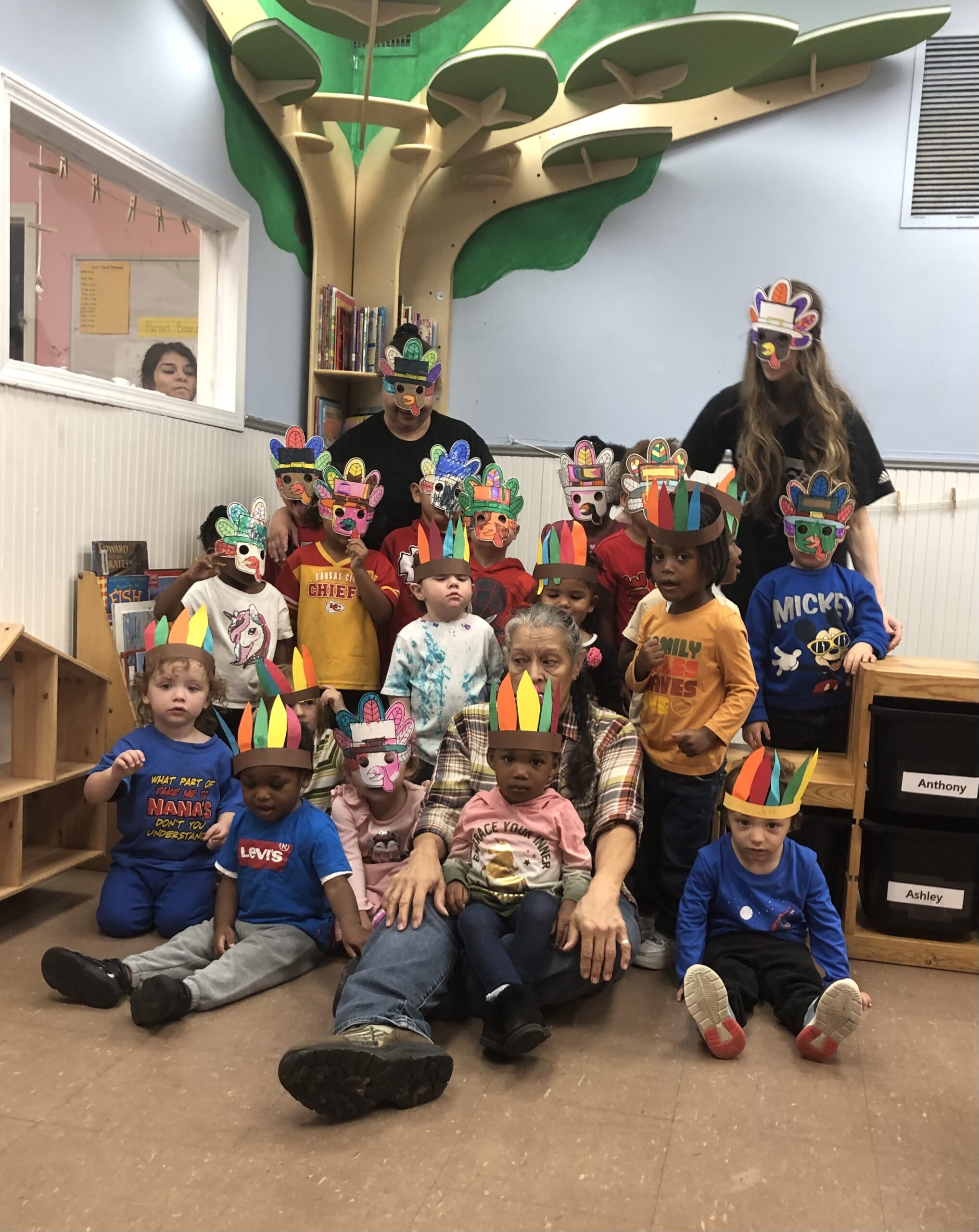
Abby Hoover
Managing Editor
Non-profit agencies, law enforcement, government officials and area stakeholders have joined forces to combat sex trafficking and prostitution in Northeast Kansas City, specifically on Independence Avenue.
The new initiative, which was introduced on April 23, includes billboards and street signs in areas known for activity, circulating photos of “Johns” – buyers of sex – and implementing reform strategies, and resources to help those who are being trafficked.
Christine McDonald, founder of Christine’s Place at 5100 Independence Avenue, was trafficked on that very street. She has since authored two books about her experience and become a voice for those being trafficked.
“I was bought and sold on this street in this Northeast corridor for 17 years,” McDonald said, adding that the last day she was paid for was November 24, 2004, on Independence Avenue at Spruce.
Historically, communities have tried to arrest their way out of this problem, and many of those arrests have been for the women, McDonald said. She still holds convictions from her time on the streets, which have become barriers for employment, housing and assistance.
“We now know with research and data – from places not just across our community and our country, but also in other parts of the world – these individuals who are being paid for have other things that lead them to this life of prostitution and exploitation,” McDonald said. “They are victims.”
The most violent experiences she had while being prostituted were at the hands of a buyer, McDonald said.
“Objectified, commodified, reduced – without emotion, without feeling, without care or concern for our livelihood,” McDonald recalled. “We are changing that – every day, invisible to the cars that passed me by, every day discarded by the people who paid for me – we are changing that, because people come into our community and pay for our people.”
From the outside looking in prostitution looks like a choice, McDonald said, but from the inside looking out it seems like there is no alternative.
“This strategy is going to say, ‘Not in our community, not in our city. Not now, not ever, will we allow you to come in and pay for our people,’” McDonald said. “If there wasn’t demand, there would not be traffickers exploiting our vulnerable.”
The initiative brings together the resources of Christine’s Place, Relentless Pursuit Outreach and Recovery (RPOR), Alison Phillips with the Special Anti-Sex Trafficking Task Force of the Missouri Attorney General’s Office, Jackson County Prosecutor Jean Peters Baker, Veronica’s Voice, Northeast Alliance Together (NEAT), Jackson County Legislator Theresa Galvin, State Representative Ingrid Burnett, the Independence Avenue Community Improvement District (CID) and Northeast Chamber of Commerce, and others.
The organizations involved are taking a multi-faceted approach to eliminate sex trafficking and prostitution at the source. This new approach focuses on the demand side, from the Johns who come into the community looking to buy people, said Scott Wagner, Director of NEAT at the Mattie Rhodes Center.
“I believe and I hope that the day is dawning that we understand the truth about prostitution, that it’s not a choice, but rather a circumstance born of a lack of choices,” Phillips said. “It’s certainly not a victimless crime.”
A majority female, they are victims of violent and sometimes deadly crimes. Three buyers were arrested in Northeast on April 22, alone.
“We can arrest every trafficker in this country, but if we never do anything to curb the demand, this will never stop,” Phillips said.
Another piece of this comprehensive strategy is sending letters to the residence of those seen soliciting prostitution, which will be facilitated by the county prosecutor’s office.
“We want them to know that they’ve been seen,” Wagner said. “We really don’t appreciate their visit.”
When Peters Baker was an assistant prosecutor it was her specialty to prosecute individuals who had been raped and victimized, and almost inevitably, Peters Baker would learn she had been a victim throughout other points of her lifetime.
“This is not a new thing, of course, but as a prosecutor I saw it so often that I couldn’t deny the pattern of what I saw,” Peters Baker said. “Johns look for people they think won’t tell on them. They look for people who they have something over. The criminal justice system used to be one of those places. We went after victims through prosecution.”
However, the system is evolving and Peters Baker and others have since learned that arrest and prosecution of prostitutes is not going to carry the community out of this. They no longer prosecute victims, but Peters Baker said it is still rare to see a case against a buyer.
Veronica’s Voice, an advocacy group for victims of human trafficking, hosts a John School, which reforms those found guilty of soliciting sex. Their partnership with the City Prosecutor’s office will bring the reformation efforts to those buyers who have been identified.
The buyers will also receive media attention through the Northeast News and a website, www.notworthitnekc.tips, reminiscent of the John TV of the early 2000’s.
“We didn’t just get here just now, there were a number of initiatives prior to this,” Northeast News Publisher Michael Bushnell said. “Through various surveillance operations we targeted crime and prostitution on Independence Avenue.”
Bushnell noted that each time he rode along on a Kansas City Police Department (KCPD) prostitution sting, the number of views the photos of Johns got was upwards of 4,500. Using those methods to share photos of buyers on social media via the KCPD Media Unit, the partners hope to deter activity on the Avenue.
The Chamber and CID, led by Bobbi Baker-Hughes, will engage the business community to not turn a blind eye.
In addition to billboards and signs that have been recently posted in locations frequented by activity, cards with information and resources will be provided to business owners on the Avenue to disseminate.
“Our businesses want this to stop,” Baker-Hughes said. “They want the Johns to go away and they want to be able to work in a peaceful community that allows the men and women who are currently being trafficked to hold their head up high and be a part of the community.”
Lee Gibson, founder of RPOR and Christine’s Place said the center gets about 20 visitors a day when they are open on Friday, Saturday and Sunday from 9 to 5.
“Last weekend we were at 950 visits of 159 different girls, so we’ll hit 1,000 visitors this weekend,” Gibson said.
Christine’s Place hosted a volunteer training on April 26 on site so the volunteers can see the building and learn how everything works. About 20 new volunteers began their training.
“We’re going to try to run those every couple months just to get more solid volunteers so we can open up more days,” Gibson said.
Christine’s Place opened in December 2020, before the building was fully renovated. Now, they’re repairing the exterior brick, and plan to paint the building and repair the roof within the next two or three weeks.
“I think we’ve noticed a little bit of a difference,” Gibson said of the center’s traffic. “We’re still getting 20 girls coming in, but in the winter a lot of them were staying all day. We’ve already noticed on these warm days, we get more girls but they stay for 10, 15, 20 minutes. They come in, take a quick shower, grab a bite to eat, and are right back on the street, so I think the volume is gonna stay the same. There’s gonna be shorter visits, and potentially more girls, because more girls will be out.”
As this anti-sex trafficking effort moves forward, the group hopes that their focus on Johns will affect the market for prostitution substantially, providing opportunities to get those being trafficked to services that will support their effort to get out of the life, while starving the demand for those services in Northeast.

















